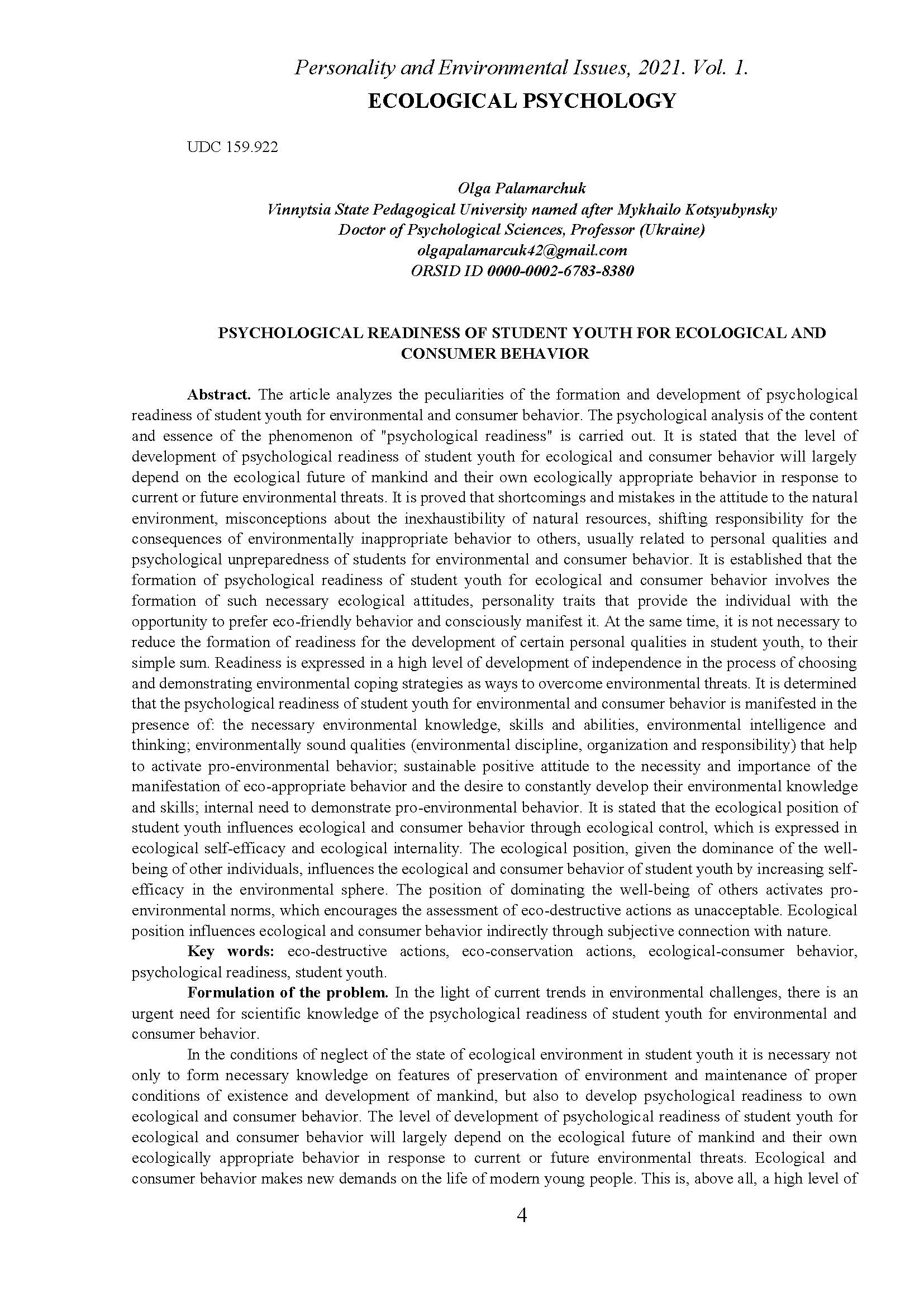Abstract
The article analyzes the peculiarities of the formation and development of psychological readiness of student youth for environmental and consumer behavior. The psychological analysis of the content and essence of the phenomenon of "psychological readiness" is carried out. It is stated that the level of development of psychological readiness of student youth for ecological and consumer behavior will largely depend on the ecological future of mankind and their own ecologically appropriate behavior in response to current or future environmental threats. It is proved that shortcomings and mistakes in the attitude to the natural environment, misconceptions about the inexhaustibility of natural resources, shifting responsibility for the consequences of environmentally inappropriate behavior to others, usually related to personal qualities and psychological unpreparedness of students for environmental and consumer behavior. It is established that the formation of psychological readiness of student youth for ecological and consumer behavior involves the formation of such necessary ecological attitudes, personality traits that provide the individual with the opportunity to prefer eco-friendly behavior and consciously manifest it. At the same time, it is not necessary to reduce the formation of readiness for the development of certain personal qualities in student youth, to their simple sum. Readiness is expressed in a high level of development of independence in the process of choosing and demonstrating environmental coping strategies as ways to overcome environmental threats. It is determined that the psychological readiness of student youth for environmental and consumer behavior is manifested in the presence of: the necessary environmental knowledge, skills and abilities, environmental intelligence and thinking; environmentally sound qualities (environmental discipline, organization and responsibility) that help to activate pro-environmental behavior; sustainable positive attitude to the necessity and importance of the manifestation of eco-appropriate behavior and the desire to constantly develop their environmental knowledge and skills; internal need to demonstrate pro-environmental behavior. It is stated that the ecological position of student youth influences ecological and consumer behavior through ecological control, which is expressed in ecological self-efficacy and ecological internality. The ecological position, given the dominance of the well-being of other individuals, influences the ecological and consumer behavior of student youth by increasing self-efficacy in the environmental sphere. The position of dominating the well-being of others activates pro-environmental norms, which encourages the assessment of eco-destructive actions as unacceptable. Ecological position influences ecological and consumer behavior indirectly through subjective connection with nature.
References
Baieva K. O. Rol ekolohichnoi pozytsii v vyznachenni spriamovanosti ekolohichnoi aktyvnosti i otsinky spravedlyvosti vzaiemodii. Zbirnyk naukovykh prats «Teoriia i praktyka suchasnoi psykholohii», 2(1), 17-23. http://www.tpsp-journal.kpu.zp.ua/archive/2_2019/part_1/5.pdf
Halian A. I. Osobystisni resursy adaptatsii maibutnikh medychnykh pratsivnykiv do profesiinoi diialnosti: avtoref. dys. … kand. psykhol. nauk : 19.00.01. Lutsk, 2016. 23 s.
Dudikova L. V. Analiz stanu hotovnosti maibutnikh medykiv do profesiinoho samovdoskonalennia. Naukovi zapysky Ternopilskoho natsionalnoho pedahohichnoho universytetu. Seriia: Pedahohika. 2009. № 2. S. 96−100.
Kolomiiets, A. M., Palamarchuk, O. M., Shulha, H. B., Kolomiiets, L. I., Haba, I. M. Psykholohichni zasady optymizatsii volonterskoi diialnosti studentskoi molodi zasobamy informatsiino-komunikatsiinykh tekhnolohii. Informatsiini tekhnolohii i zasoby navchannia, 71(3), 267-281. http://doi.org/10.33407/itlt.v71i3.2846
Kriazh, I. V. (2021). Ekolohichni ustanovky studentiv yak indykator efektyvnosti osvity dlia staloho rozvytku. Visnyk Kharkivskoho natsionalnoho universytetu imeni V. N. Karazina. Seriia «Psykholohiia», 70, 51-62. https://doi.org/10.26565/2225-7756-2021-70-07
Yaroshchuk I. D. Struktura ta rivni hotovnosti maibutnikh fakhivtsiv do profesiinoi diialnosti. Naukovi zapysky. Seriia: Pedahohika. 2010. № 2. C. 66–73.Homburg, A., Stolberg, A., & Wagner, U. (2007). Coping with global environmental problems: Development and first validation of scales. Environment and Behavior, 39(6), 754-778. http://doi.org/10.1177/0013916506297215

This work is licensed under a Creative Commons Attribution 4.0 International License.
Copyright (c) 2022 Personality and Environmental Issues




